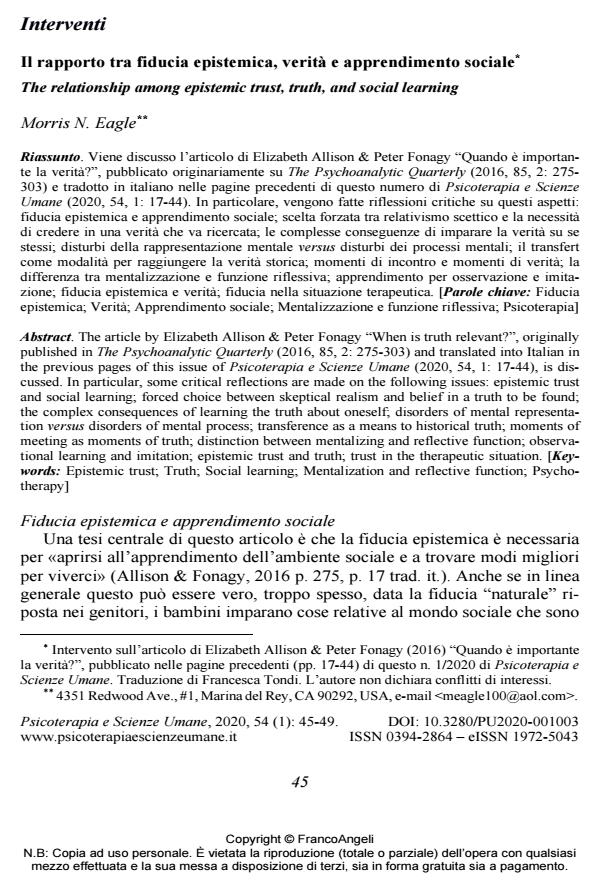The relationship among epistemic trust, truth, and social learning
Journal title PSICOTERAPIA E SCIENZE UMANE
Author/s Morris N. Eagle
Publishing Year 2020 Issue 2020/1
Language Italian Pages 5 P. 45-49 File size 62 KB
DOI 10.3280/PU2020-001003
DOI is like a bar code for intellectual property: to have more infomation
click here
Below, you can see the article first page
If you want to buy this article in PDF format, you can do it, following the instructions to buy download credits

FrancoAngeli is member of Publishers International Linking Association, Inc (PILA), a not-for-profit association which run the CrossRef service enabling links to and from online scholarly content.
The article by Elizabeth Allison & Peter Fonagy "When is truth relevant?", originally published in The Psychoanalytic Quarterly (2016, 85, 2: 275-303) and translated into Italian in the previous pages of this issue of Psicoterapia e Scienze Umane (2020, 54, 1: 17-44), is discussed. In particular, some critical reflections are made on the following issues: epistemic trust and social learning; forced choice between skeptical realism and belief in a truth to be found; the complex consequences of learning the truth about oneself; disorders of mental representation versus disorders of mental process; transference as a means to historical truth; moments of meeting as moments of truth; distinction between mentalizing and reflective function; observational learning and imitation; epistemic trust and truth; trust in the therapeutic situation.
Keywords: Epistemic trust; Truth; Social learning; Mentalization and reflective function; Psychotherapy
- Online psychological support in the COVID‐19 era: Social representations, trust and perceived effectiveness from the perspectives of clients and professionals Elisa Colì, Loredana Gavrila, Dacia Cozzo, Rino Falcone, in Counselling and Psychotherapy Research /2024 pp.1415
DOI: 10.1002/capr.12779 - Risposta agli interventi di Morris N. Eagle, Mauro Fornaro e George Silberschatz Elisabeth Allison, Peter Fonagy, in PSICOTERAPIA E SCIENZE UMANE 1/2020 pp.59
DOI: 10.3280/PU2020-001006
Morris N. Eagle, Interventi. Il rapporto tra fiducia epistemica, verità e apprendimento sociale in "PSICOTERAPIA E SCIENZE UMANE" 1/2020, pp 45-49, DOI: 10.3280/PU2020-001003